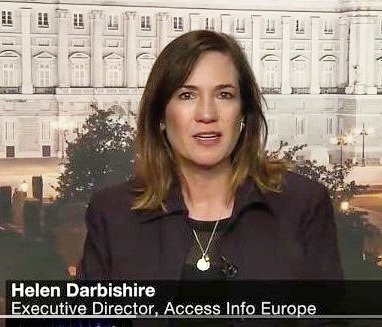Madrid, 5 April 2019 – In its comments submitted to the public consultation on the draft Regulation for Spain’s 2013 Transparency Law, Access Info has urged the government to take the opportunity to strengthen the right of access to information, with measures such as simplifying the request procedures.
Specifically, Access Info has recommended that the new Regulation permit requests by email in place of the current complicated process whereby only persons with a an electronic ID or digital certificate and make requests via the Transparency Portal.
“It is especially worrying that in Spain so few requests are made because of the difficulty of submitting them,” said Helen Darbishire, Executive Director of Access Info Europe
Access Info also raised serious concerns about certain aspects of the draft Regulation, including in particular the concept of “abusive requests”, which allows for the refusal to even process requests if they are deemed put the rights of others at risk or can be considered to go against norms, customs, or good faith.
According to Darbishire “rather than putting obstacles in the way of accessing the information held by public bodies, the Regulation should contribute to improving transparency.”
The term abusive requests in the draft Regulation further jeopardises the right of access to information because it gives public officials the margin to decide whether or not they will even process a request on very subjective grounds.
“All people should have the right to request information guaranteed, with neither the motivation nor the identity of the requester being relevant”, commented the director of Access Info Europe.
Among the strong points of the draft Regulation, Access Info welcomed the incorporation of archives in the scope of the Transparency Law, as well as the obligation on public officials to assist requesters.
The organisation also welcomed the proposal to create a “legislative footprint” that will allow the public to follow decision making inside the public administration and legislative bodies.
Other recommendations to improve the Regulation are:
- Eliminating any language that seeks to determine the motivation of the requester or how they will use this information, conditions which must never be necessary to make a request. Access Info noted that the Transparency Law clearly states that all information is public and that the only limitations are those in articles 14 and 15;
- Including the Royal Household, the Bank of Spain, and the Court of Auditors in the Regulation, given that they are under the scope of the Law of Transparency;
- Clarifying and speeding up the process of transferring a request to another organisation that has the information;
- Requiring the conservation of all information whose publication in the Transparency Portal is required by the Transparency Law: Once published, the information must always be available to the public;
- Ensure the right to request from bodies under the scope of the Transparency law access to any information held by them which has been elaborated by bodies that are outside the scope of the Law;
- Guaranteeing the public access to information in all cases of partial access by allowing the requester to determine if the information provided is useful, regardless of whether or not it seems meaningful to the public body;
- Clarifying that the timeframe for processing requests starts the moment the request is submitted.
Access Info noted that the Regulation for the Transparency Law of should have been adopted in the first three months after the adoption of the Law, that is to say, in the first quarter of 2014. In 2017, the Government included in their Third Open Government Action Plan the commitment to adopt the Regulation within two years, a period that finishes in June 2019.

